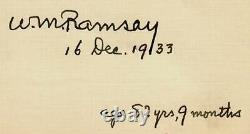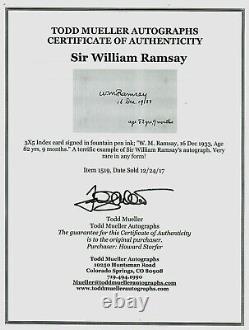
- Homepage
- Autograph Type
- Celebrity
- Industry
- Object Type
- Signed
- Signed By
- A Star (12)
- Al Pacino (7)
- Artist Ms (11)
- Barack Obama (5)
- Betty White (5)
- Billy Wirth (5)
- Carrie Fisher (20)
- Dalai Lama (5)
- Donald Trump (30)
- Hong Eunchae (5)
- Jimmy Carter (5)
- Mike Trout (8)
- Roman Polanski (5)
- Ryan Reynolds (4)
- Shohei Ohtani (9)
- Stan Lee (7)
- Stephen Curry (5)
- Taylor Swift (5)
- Tom Brady (5)
- Tom Hardy (6)
- Other (4102)
Scottish Archaeologist William Ramsay Hand Signed 3X5 Card COA




William Ramsay Hand Signed 3X5 Card Dated 1933. This item is certified authentic by Todd Mueller and comes with. (15 March 1851 - 20 April 1939) was a Scottish. By his death in 1939 he had become the foremost authority of his day on the history of Asia Minor and a leading scholar in the study of the New Testament. Ramsay was educated in the Tübingen school of thought founded by.
Which doubted the reliability of the New Testament, but his extensive archaeological and historical studies convinced him of its historical accuracy. Professor of Classical Art and Architecture. At Oxford, he was appointed. (the Latin Professorship) at Aberdeen. Knighted in 1906 to mark his distinguished service to the world of scholarship, Ramsay also gained three honorary fellowships from Oxford colleges, nine honorary doctorates from British, Continental and North American universities, and became an honorary member of almost every association devoted to archaeology and historical research.
He was one of the original members of the. And was awarded the Gold Medal of. In 1893 and the Victorian Medal of the.The youngest son of a third-generation lawyer, Thomas Ramsay and his wife Jane Mitchell, daughter of. His father died when he was six years old, and the family moved from the city to the family home in the country district near. The help of his older brother and his maternal uncle, Andrew Mitchell of Alloa, made it possible for him to have an education at the Gymnasium in. Where he achieved high distinction and later became Professor of Humanity. He won a scholarship to.
Where he obtained a first class in classical moderations (1874) and in. In 1880 Ramsay received an Oxford studentship for travel and research in Greece. At Smyrna, he met Sir C.
Wilson, then British consul-general in Anatolia, who advised him on inland areas suitable for exploration. Ramsay and Wilson made two long journeys during 1881 and 1882.
He traveled widely in Asia Minor and rapidly became the recognized authority on all matters relating to the districts associated with St Paul's missionary journeys and on. Greece and Turkey remained the focus of Ramsay's research for the remainder of his academic career. In 1883, he discovered the world's oldest complete piece of music, the. In the late 19th century, he discovered two of the most important Phrygian monuments - the rock tombs "Aslantas" (Lion Stone) and "Yilantas" (Snake Stone), located close to the city center of Afyon. In 1890 he discovered inscriptions in an unknown Anatolian language. A description of which he published in 1895. He was known for his expertise in the historic. And of its political, social, cultural, and religious history. After becoming a Fellow of. In 1882, from 1885 to 1886 Ramsay held the newly created.Lincoln Professor of Classical Archaeology and Art. At Oxford and became a fellow of. In 1886 Ramsay was appointed. At the University of Aberdeen. He remained affiliated with Aberdeen until his retirement in 1911.
From 1880 onwards he received the honorary degrees of D. St Andrews and Glasgow, and D. In 1906, Ramsay was knighted for his scholarly achievements on the 400th anniversary of the founding of the University of Aberdeen. He was elected a member of learned societies in Europe and America and was awarded medals by the.
In 1919, Ramsay served as president of the Geographical Association.

